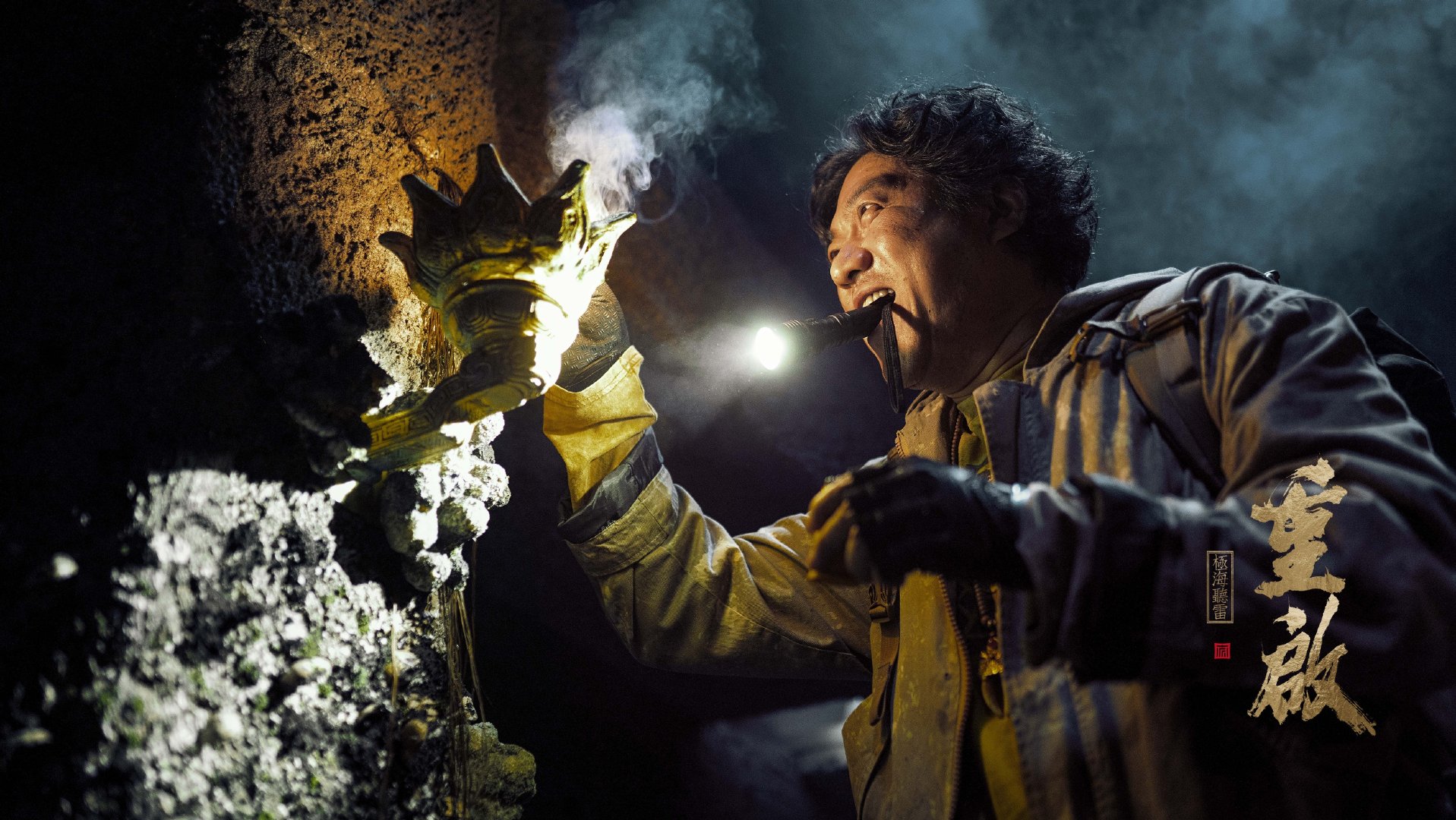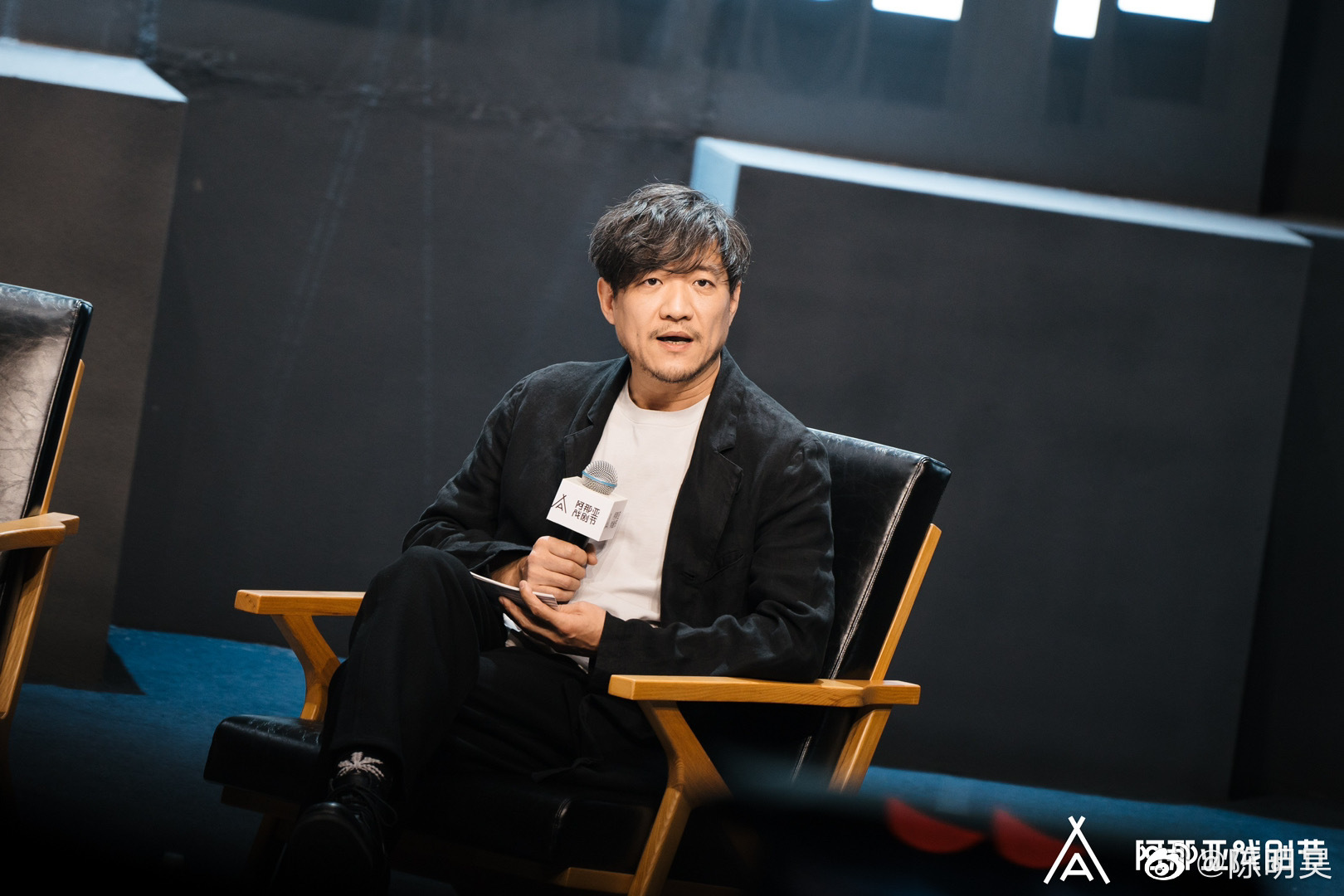
Chen Minghao is an actor who showcases a unique charm both on the theater stage and in film and television dramas. His journey began at the Central Academy of Drama, where he formed a bond with stage plays, accumulating rich performance experience and exploring his craft through productions such as "Red," "The Seventh Day," "Teahouse," and "Two Dogs' Life Opinions." When he transitioned from the theater to the screen, his distinctive character portrayal and image immediately captured the attention of audiences and the industry. Recently, his new drama "藏海花" (Cang Hai Hua) premiered, and as soon as his character Wang Pangzi appeared, viewers expressed warm feelings, stating it felt like a "steady happiness."

Still from "藏海花" (Cang Hai Hua)
In 2018, in the drama "沙海" (Sha Hai), Chen Minghao first portrayed Wang Pangzi, a key character in the "Grave Robbers' Chronicles" universe. His rugged and uninhibited personality was a perfect match for the character. He later reprised the role in "重启之极海听雷" (Chong Qi Zhi Ji Hai Ting Lei) and "藏海花" (Cang Hai Hua). For him, Wang Pangzi is a polarized character: possessing both delicate emotions and a rough zeal. The presence of the "Iron Triangle" also requires him to consider the interplay between his character and those of Wu Xie and Zhang Qi Ling, rather than viewing Wang Pangzi in isolation. Despite his analytical approach to performance, Chen Minghao candidly admits that he often simply follows his instincts when it comes to acting.
During the interview, he spoke casually, rejecting "labels" and "concepts." He aims to use the simplest language to describe his thoughts, yet his sincerity and seriousness about acting shine through. He aspires to "establish a life connection with the character," candidly acknowledging that although transitioning from stage to screen poses many challenges, it all stems from physical involvement and an "isolated" mental and emotional experience. In his view, the best fortune for an actor is encountering a script and character that align with their life stage, akin to seeing a beauty in the eyes of a lover, allowing for mutual influence and organic performances during that time.
While shooting "藏海花," the crew traveled to western Sichuan for location filming, and Chen Minghao was struck by the beauty of the hidden landscapes along the way. He remarked, "What’s the point of staying in the city all the time? It’s better to go out, even if you don’t know where to go." For him, life is short, and on this journey, one should dedicate time to seeking art, truth, and love.
【Dialogue】
Pengpai News: This is already your third time portraying Wang Pangzi. Do you feel more at ease now, or does it feel tiresome without any freshness? Has your initial understanding of this character changed over time?
Chen Minghao: Actually, each time I perform, I go with my instincts. I find that communicating with San Shu (the original author, Nan Pai San Shu) is more effective than reading. The story and characters are embedded within him, so I tend to talk to him a lot. The feelings he shares help me draw inspiration and shape the image of this character. Additionally, the existence of the "Iron Triangle" means that Wang Pangzi cannot be viewed in isolation; we need to consider the performances and characterizations of all three characters together.
"藏海花" (Cang Hai Hua) leans towards romance, featuring a long narrative focused on Wu Xie and Wang Pangzi, while the Little Brother exists in stories told at different times, creating a different performance vibe. There are still fresh elements to explore. Wang Pangzi is a character with significant tension; he embodies both a flamboyant side and a delicate side, so it's essential to find the balance between these two aspects.

Still from "藏海花" (Cang Hai Hua)
Pengpai News: In "重启之极海听雷" (Chong Qi Zhi Ji Hai Ting Lei), you and the costume designer created many cartoonish outfits for Wang Pangzi. In an interview, you mentioned his inner innocence, which was striking and helped shape the character. In this instance, the revealed character looks more "mature and steady." Has Wang Pangzi finally "submitted to age"?
Chen Minghao: Whether Wang Pangzi submits to age depends on whether there’s something to keep him busy. If there is, we'll set off again with a youthful heart. What’s on the surface doesn’t matter much. We can switch our clothes or not, but that's a superficial issue. The character fundamentally resides within their inner self and where their heart leads them.

Still from "重启之极海听雷" (Chong Qi Zhi Ji Hai Ting Lei)
Pengpai News: Over the years, you've experimented with various roles in film and television, receiving much praise. However, when you initially transitioned from the stage to screen, did you encounter any setbacks or reflections in your performances? Could you share more about that?
Chen Minghao: The forms of expression, processes, creative states, and working environments are different between the two. However, both require a physical investment, as well as a period of “isolation” from the outside world. Actors can be quite peculiar; sometimes they need to step outside of their creations, while at other times, they must immerse themselves in it. I believe the optimal state for character creation is finding a life connection with that role during that period—not just when performing, but also allowing the character to impact your daily life; this way, your acting becomes effortless.
Pengpai News: After many years in the industry, do you find your perspective on acting has shifted compared to when you first started?
Chen Minghao: This question can be big or small. You can say there are similarities and differences, and that wraps it up. If we dive deeper, there are many nuances. Anyway, I still rely on my instincts.
I started with stage plays at the Central Academy of Drama, and this aspect has stayed with me. In the past, I was relatively unfamiliar with film and television acting, and my emotional connection to stage performances only deepened over time. There was a phase when I even resisted other forms of acting, but that mindset was incorrect. Eventually, performing in film and television made me reflect on many issues, and upon returning to the stage, I realized that my experiences in TV acting actually benefited my theatrical performances, allowing me to think about drama from different angles. This included insights gained from stage presentations and real-time filming, as well as physical aspects of my craft I’ve developed while performing on stage. I believe both sides can support each other, which is great, but time management is a challenge—when I’m busy with one, I can’t work on the other.
Take theatrical performance as an example; you need enough time. You must spend a considerable amount of time immersed in it to truly grasp the nuances, similar to painting a picture—staring at a blank canvas for a long time helps you understand what to create.

Chen Minghao at the Anaya Drama Festival
Pengpai News: Only through complexity and richness can a successful character be born. However, the public often tends to define characters in "black and white." We frequently encounter “labels” in public opinion. How do you view this phenomenon?
Chen Minghao: I don’t see a problem with it. Whether it’s labeling or others’ interpretations, I’m indifferent to those things. It’s similar to cooking; once your dish is prepared, you handle your kitchen work, and once it’s served, how others perceive it is a new story you’ll face later. I believe creation and criticism are matched; they should both be approached with sincerity. If someone casually dishes out flippant remarks, it’s not worth taking seriously.
Pengpai News: You’re already a very mature actor. Can you easily accomplish any role and script you’re familiar with? How do you maintain your enthusiasm for continual breakthroughs and experimentation?
Chen Minghao: The work itself must possess charm and energy. At the beginning of creation, you can’t assert definitively, “This is a great play; this is a great role,” because it hasn’t fully formed yet. When analyzing a script, if it aligns perfectly with your life stage, it’s akin to falling in love—when you connect, it’s right, as beauty lies in the eyes of the beholder. If it fits you well, you can infuse good energy into the story, bringing the character to life.
Pengpai News: When the workload is significant, what do you do to quickly restore your state?
Chen Minghao: I’ve been exercising more lately, often rising early to run. Exercise offers a sense of solitude where I can focus on my breathing and connect with my life, awakening the energy for the day.

Real snowy mountains from "藏海花" (Cang Hai Hua)
Pengpai News: This shoot took place in picturesque western Sichuan, but did it bring about any physical or mental challenges during filming and acting? Were there any particular scenes or encounters there that left a deep impression on you?
Chen Minghao: Being in such a different environment than the city certainly changes your perspective. You definitely feel shifts in your body. Moreover, the route we traveled was quite exhilarating; getting anywhere required a long journey of winding roads. But along the way, you also garner lots of beautiful scenery. Seeing the mountains and trees invokes a sense of awe for nature, prompting thoughts like, “What’s the point of staying in the city? It’s better to go out, even if you don’t know where to go.” At that moment, I felt that in "藏海花" (Cang Hai Hua), the "Iron Triangle" was on a journey to uncover secrets or truths. To me, this means that life is short, and on this road, there’s only enough time to seek art, truth, and love.